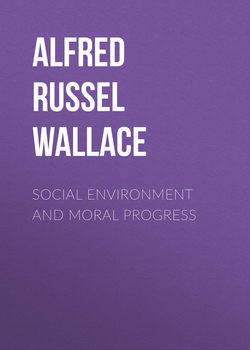Читать книгу Social Environment and Moral Progress - Alfred Russel Wallace, Alfred Russel Wallace - Страница 7
PART I.—HISTORICAL
CHAPTER VII
A SELECTIVE AGENCY NEEDED TO IMPROVE CHARACTER
ОглавлениеThe general result of the facts and arguments now set forth in the merest outline leads us to conclude that there has been no definite advance of morality from age to age, and that even the lowest races, at each period, possessed the same intellectual and moral nature as the higher. The manifestations of this essentially human nature in habits and conduct were often very diverse, in accordance with diversities of the social and moral environment. This is quite in accordance with the now well-established doctrine that the essential character of man, intellectual, emotional, and moral, is inherent in him from birth; that it is subject to great variation from individual to individual; and that its manifestations in conduct can be modified in a very high degree by the influence of public opinion and systematic teaching. These latter changes, however, are not hereditary, and it follows that no definite advance in morals can occur in any race unless there is some selective or segregative agency at work.
As there is a great amount of misconception on this subject some explanation may be advisable. Many well-educated and intelligent persons seem to think that whatever characters or faculties are hereditary are also necessarily cumulative. They hear that mental as well as physical characteristics are hereditary; their own observation tells them that there are musical families as well as tall families. They hear that the late Sir Francis Galton wrote a book on Hereditary Genius, and perhaps they have read it; but they do not observe that neither he nor anyone else has proved that genius of any kind is cumulative, that is that a man or woman of genius will have, on the average, some one or more children with a greater amount of that special power or faculty than their own. The very contrary of this is really the case. The more a person's talent or mental power is above the average the less chance there is that any of his or her children will have still more of that power than he has. A really great poet, or painter, or musician, appears suddenly in a family of mediocre ability or of no ability at all in that special direction. A few examples may be instructive.
Sir William Herschell was the son of a German musician, and was himself a musician by profession; but he became an astronomical genius, one of the greatest of his age. His son, Sir John Herschell, was a very clever man, with advantages of education and position. He followed his father as an astronomer, and was a great mathematician, but is never considered to be equal to his father. Darwin's most eminent son was a mathematician, not a naturalist.
The reason of this is that heredity follows the law of "recession to mediocrity." This is, that all groups of living things vary around an average or mean as regards each of their characters; and those near the average are always numerous, while as we approach the extremes in either direction the numbers become less and less. Families follow the same law. If you take a family for three or four generations, including perhaps some hundreds of persons, some will be short, some tall; but the majority will be near the mean, and the tallest of all will be less likely to have taller descendants than themselves than those nearer the average. But the children of the tallest, though generally shorter than their parents, will still tend to be above the average height.
When a character is so useful to its possessor in the struggle for existence as to be of what is termed "survival value," then those that vary most above the average will be preserved or selected generation after generation as long as the increase is useful.
It is because the higher intellectual or moral powers are so rarely of life-preserving value, and are not unfrequently the reverse, that they are not cumulative, though they are hereditary.
With this explanation we will now proceed to examine somewhat closely our moral position as a nation; what is the nature of our social environment; how it came to be what it is, and what lessons we may learn from it.
